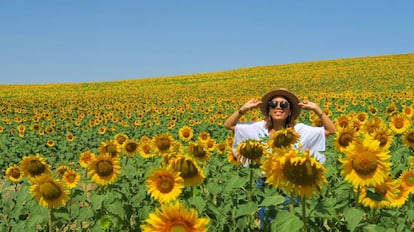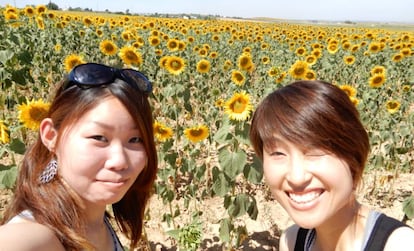Why are the Japanese so obsessed with Spain’s sunflowers?
Huge plantations near Carmona, in Andalusia, are attracting growing numbers of Asian visitors
The picturesque town of Carmona, some 35 kilometers northeast of Seville, has much to commend it: extensive Roman remains, a Moorish alcazar, or fortress, impressive walls, Baroque palaces and innumerable churches. But growing numbers of visitors, particularly from Japan, are drawn here for the spectacular sunflower fields on the outskirts of the town.

“We’ve seen a huge increase in visitor numbers from Japan, as well as China and Korea,” says Paula Moreno, who runs Carmona’s tourism office. “It’s hard to say whether it’s just for the sunflowers, but rarely a day goes by without several groups or couples interested in seeing them.” She says the number of visitors from Asia has increased from some 2,900 in 2012 to more than 4,000.
Mai Muraki, a twenty-something visitor from Japan, says she has come to Carmona especially to see the sunflower fields. “I love sunflowers, they are beautiful, I love their color, their sheen, their elegance. I’ve always loved them, ever since I was a child,” she confesses.
I love sunflowers, they are beautiful. I love their color, their sheen, their elegance Mai Muraki, Japanese tourist
Muraki and a friend are waiting outside the tourism office for a taxi to take them to the sunflower fields, which cover more than 5,000 hectares. “I don’t know if I’ll have time to take all the photos I want,” she says.
“Visitors have two options: they can take a taxi or use Girasoles de Carmona, which provides a tour of the farm, by a horse-drawn buggy if there is enough time, as well as information about sunflower growing,” says Moreno. “They have sunflowers in Asia, but not on this scale, where they stretch beyond the horizon,” she adds, noting that the tourism office of Carmona is now in touch with travel agencies in Asia to organize larger groups during the growing season, which begins in May and lasts until the harvest in July.
“They transmit happiness, something positive,” says Muraki, holding onto a bag of sunflower seeds the tourism office has given her to plant. “They are full of life, full of light,” she adds.

Moreno explains that many visitors from Asia tell her that sunflowers represent vitality and fertility, and that in some parts of Japan there are sunflower festivals. “They say they represent light, life, the sun,” adds Victoria Pérez of Girasoles de Carmona, who also shows visitors the very Spanish art of cracking open sunflower seeds – known as pipas – with her teeth.
Another visitor to Carmona, Jun Zhang, says that he “fell in love” with sunflowers after seeing Sophia Loren in the 1970 movie, Sunflower. “They fascinated me,” he explains, describing the fields in Spain as “an endless sea of light.”
Sunflower lovers can adopt a 40-square-meter patch and receive videos and photographs of every aspect of the growth cycle
“They fill me with peace, with happiness,” he says, returning from a walk through the fields. “They make you want to lose yourself and stay there forever, hidden, or for 24 hours at least.”
In response to the growing international interest in Carmona’s sunflowers, Girasoles de Carmona is now offering virtual plantations. Via the internet, sunflower lovers can adopt a 40-square-meter patch for €250 and receive videos and photographs of every aspect of the growth cycle, from planting to harvest. They are then sent a dried sunflower from their patch.
“For the first year, we have already received a good few requests. But above all, we get a lot of requests for information,” says Pérez.
English version by Nick Lyne.
Tu suscripción se está usando en otro dispositivo
¿Quieres añadir otro usuario a tu suscripción?
Si continúas leyendo en este dispositivo, no se podrá leer en el otro.
FlechaTu suscripción se está usando en otro dispositivo y solo puedes acceder a EL PAÍS desde un dispositivo a la vez.
Si quieres compartir tu cuenta, cambia tu suscripción a la modalidad Premium, así podrás añadir otro usuario. Cada uno accederá con su propia cuenta de email, lo que os permitirá personalizar vuestra experiencia en EL PAÍS.
¿Tienes una suscripción de empresa? Accede aquí para contratar más cuentas.
En el caso de no saber quién está usando tu cuenta, te recomendamos cambiar tu contraseña aquí.
Si decides continuar compartiendo tu cuenta, este mensaje se mostrará en tu dispositivo y en el de la otra persona que está usando tu cuenta de forma indefinida, afectando a tu experiencia de lectura. Puedes consultar aquí los términos y condiciones de la suscripción digital.









































